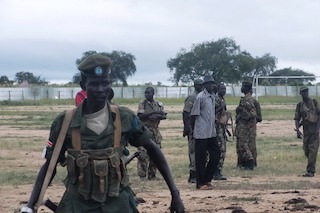SPLA soldiers sentenced to death for Jonglei crimes
October 24, 2013 (JUBA) – South Sudan’s army (SPLA) announced on Thursday that military courts have sentenced to death some of the 31 soldiers arrested on charges of murder, rape and human rights violations in the troubled eastern state of Jonglei.

“So these 31 soldiers were arrested in various counties between Pibor, Bor and Akobo and they were sentenced. Some were found guilty and dismissed from the army and some others were jailed for various number of years ranging from one year to five years”, Aguer said.
Five soldiers convicted of murder were sentenced to the death penalty. Two soldiers face prison sentences after being found guilty of rape. The majority, 24, were charged with misconduct due to frequent drinking. All the cases were heard in a military court.
The SPLA has a weighty presence in Jonglei following a state-wide disarmament campaign launched in March 2012 to address widespread insecurity and conflict between rival cattle herding groups.
During the height of the disarmament campaign over 10,000 were deployed to the area but now officials decline to confirm how many troops are stationed across Jonglei.
The army has been fighting rebels led by David Yau Yau – with a short break when he accepted a presidential amnesty – since he lost elections in 2010.
In September Human Rights Watch reported that SPLA soldiers have also been targeting civilians from Yau Yau’s community, the Murle. The report says that there were “24 incidents of unlawful killings of almost 100 members of the Murle ethnic group between December 2012 and July 2013, constituting serious violations of international humanitarian and human rights law”.
Aguer said that those found guilty of the worst crimes will face capital punishment as per the SPLA’s code of conduct and South Sudan’s transitional constitution of 2009.
“The most heavier sentence for the judges is capital punishment this is for murder cases, those who have got capital punishment are to be approved by the president who is the commander in chief of the army, some of those cases are still to be approved by the president”, he added .
Last year rights groups called on the South Sudanese government to stop using capital punishment and have pointed to the young nation poor justice system.
Aguer, however, says that the only answer for those who deliberately commit murder is to face the capital punishment.
The SPLA is still in the process of evolving from the a disparate rebel group into a professional army. South Sudan seceded from Sudan in 2011 after a referendum agreed as part of a 2005 peace deal.
Aguer said the army is training its troops to respect and enforce law and order.
“SPLA has the basic rules and regulations that are strengthen from the constitution of South Sudan, we have rules and regulations, we have the SPLA Act. We have the SPLA’s White Paper on Defence (of 2008) that guide the army transformation. So, we assure our public that we are professionalizing our army”, said the military spokesperson.
“We are building a conventional army that should respect both internal and international laws”, he further stressed.
The SPLA arrested the commander of Pibor county Brigadier General James Otong in August pending an investigation into whether troops under his command violated the rules of engagement. Officials say the investigation is still on-going.
This is the first time the SPLA has charged soldiers for committing serious crimes such as murder or rape.
(ST)
